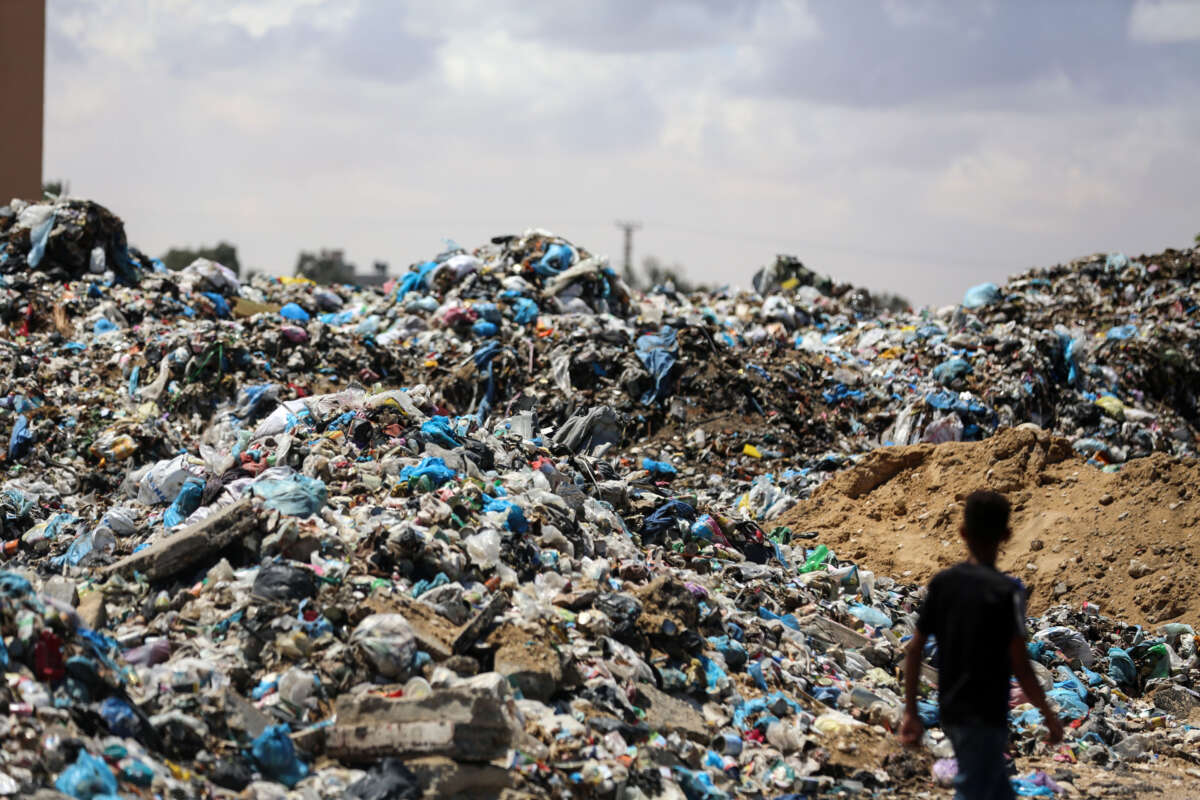The UN has reported that hundreds of thousands of tons of solid waste have accumulated near populated regions of Gaza as humanitarian groups are warning that disease is spreading rapidly through the strip.
As of this week, the UN’s Global Water, Sanitation and Hygiene (WASH) Cluster has estimated that there are 330,400 tons of solid waste near places where Palestinians — many of them displaced numerous times due to Israel’s bombing — are taking shelter. This is an increase from the over 270,000 tons of waste that Gaza officials reported had accumulated in the streets in mid-May.
The dangerous waste situation is due to Israel’s destruction of water and waste infrastructure, including 100 waste collection vehicles and machines, as well as dire fuel shortages manufactured by Israel’s blockade which aims to undermine all systems that support life in Gaza.
Israel is continuing to block fuel shipments to Gaza, compounding health-related issues. In the week between May 26 and June 2, only 20 percent of the fuel needed weekly to continue the operation of water facilities was delivered into the region, the WASH Cluster reported, with deliveries having been suspended in another recent week because of intense military activity in southern Gaza.
Daily water production has been cut to only a quarter of what it was before Israel’s current assault began in October, the UN reported.
This comes a month after the UN Relief and Works Agency for Palestine Refugees (UNRWA) warned that Israel’s near-total blockade of humanitarian aid following its takeover of the Rafah crossing will lead to a major drop in sanitation services — followed by the rapid spread of disease, which scholars have previously pointed out is often used as a deliberate tactic in genocide.
“There is no fuel for the sanitation workers to move any of the trash piling up. It’s summer, disease is spreading, there is trash everywhere. There’s no fuel to run generators for hospitals, there’s no fuel for the water supply. The water supply is going to shut off,” UNRWA communications director Louise Wateridge had warned at the time.
Many of Wateridge’s warnings have come true. Trash has piled up in the streets, some of which have been turned into dumping grounds. Only an estimated 20 percent of trash is being collected, while large pools of standing water are spreading pollution and allowing insects to breed rapidly. Hospitals — which Israeli forces have repeatedly targeted — are regularly overloaded with casualties of Israel’s constant bombardment and raids.
As health care access has dwindled, public health risks have skyrocketed, worsened by the fact that large segments of Gaza’s population are seriously wounded and regularly going days without food. Palestinian officials recently reported that there are over 1.1 million cases of infectious disease in Gaza, or at least one disease for every two people on average. Disease is having an especially devastating effect on children, with an estimated 90 percent of children under five suffering from infectious diseases. Oxfam warned last month that conditions are “ripe” for an epidemic of cholera and Hepatitis A.
Secretary of State Antony Blinken acknowledged in remarks at a conference on Gaza in Jordan on Tuesday that 95 percent of Palestinians in Gaza are unable to access clean drinking water, while “most of Gaza’s sanitation system has been destroyed.” However, the U.S. has continued its unmitigated support for Israel, having used essentially none of its leverage so far to pressure Israel into following its obligations under international law and opening up humanitarian pathways into Gaza.
Speaking against the authoritarian crackdown
In the midst of a nationwide attack on civil liberties, Truthout urgently needs your help.
Journalism is a critical tool in the fight against Trump and his extremist agenda. The right wing knows this — that’s why they’ve taken over many legacy media publications.
But we won’t let truth be replaced by propaganda. As the Trump administration works to silence dissent, please support nonprofit independent journalism. Truthout is almost entirely funded by individual giving, so a one-time or monthly donation goes a long way. Click below to sustain our work.
